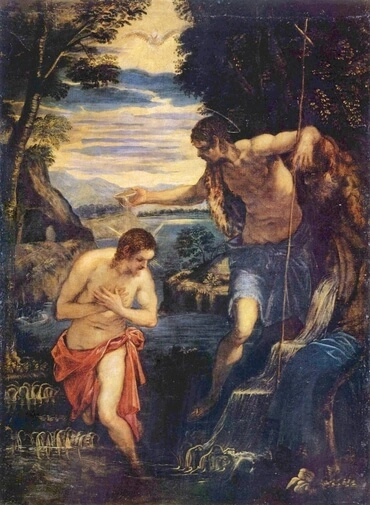Explicación de Juan 1:6
Por Brian David (Traducido por computadora al Español)

Los primeros cinco versos de Juan 1 ("El Verbo era Dios") muestran cómo el amor infinito del Señor fluye hacia nosotros a través de su humanidad divina en formas que pueden crear e inspirar, lo que los Escritos llaman verdad divina - y que como la gente se apartó repetidamente Él proyectó su humanidad en forma física como Jesús para llegar a ellos una vez más.
En este versículo comenzamos a ver cómo la gente puede interactuar con esa verdad y volverse hacia el Señor.
Entonces, ¿por qué, te preguntarás, empieza con Juan el Bautista? Porque Juan representa el significado externo y literal de la Palabra del Señor: las historias, leyes y profecías reales de la Biblia. Estos elementos externos forman un contenedor para la inspiración espiritual que hay en su interior, y tenemos que ser capaces de sostener el contenedor para poder participar en su contenido.
"Hombre" representa aquí la verdad, o las expresiones de amor en forma de ideas, cosas conformadas a nuestro intelecto. "Dios" representa lo externo del Señor, que es el poder que proyecta en forma de verdad divina. Y "nombre" representa todas las cualidades del elemento espiritual completo que se describe.
Así podemos ver que el significado literal de la Biblia -y las palabras y acciones externas de Jesús durante su vida física- fueron verdaderas proyecciones del amor perfecto del Señor en las formas más externas. Y tenemos que abrazarlas para abrirnos a las verdades más profundas de nuestro interior.
Arcana Coelestia #6296
6296. 'But truly his younger brother will become greater than he' means that good from truth, thus the spiritual man, will receive even greater increase. This is clear from the representation of Ephraim, to whom 'younger brother' refers here, as truth that belongs to the understanding within the natural and is born from the internal, dealt with in 6234, 6238, 6267, though 'Ephraim' at this point is good from truth, dealt with below; and from the meaning of 'becoming greater than another' as receiving even greater increase. The reason why here 'Ephraim' is good from truth is that he represents the member of the spiritual Church - the member of the external spiritual Church, to be exact - just as 'Manasseh' represents the member of the external celestial Church, 6295. What makes someone a member of the spiritual Church is good from truth - the internal part of that Church being what 'Israel' represents, the external what 'Ephraim' represents. A member of the spiritual Church differs from a member of the celestial in the fact that the spiritual member's good has been implanted in the understanding part of his mind, whereas the celestial member's has been implanted in the will part, see 863, 875, 895, 927, 928, 1023, 1043, 1044, 2256, 4328, 4493, 5117. This difference goes to explain why 'Ephraim' represents the spiritual man, and 'Manasseh' the celestial man.
[2] The reason why good from truth, or the spiritual man, will receive greater increase than good which gives rise to truth, which is the celestial man, is that the human will has been unceasingly corrupted, so corrupted that at length evil has taken complete possession of it, with the result that nothing sound has remained there. So that a person is not destroyed on account of this the Lord has seen to it that the understanding part of his mind may be regenerated and that he may thereby be saved. This now explains why there are few who still have any soundness in the will part of their mind, thus why there are few who can become celestial people but many who can become spiritual ones; and this in turn explains why those who are spiritual will receive greater increase than those who are celestial. This then is the meaning of 'his younger brother will become greater than he'.






